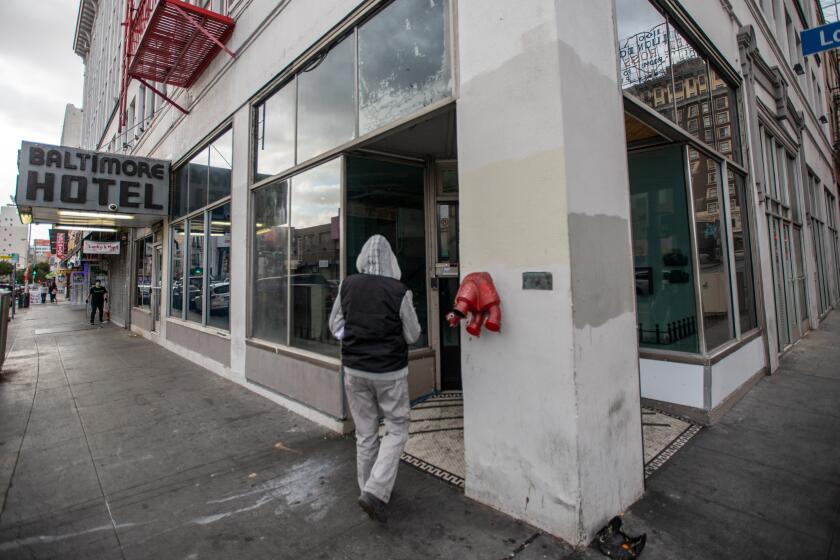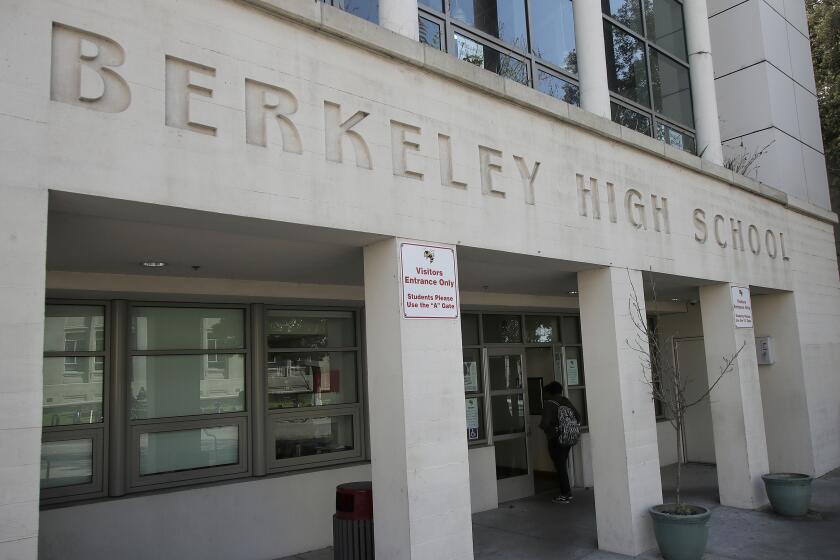State faces rising tide of red ink
California now faces an unprecedented $41.8-billion budget gap by July 2010, with the cascading economic crisis forcing state economists to increase the already dismal projections they made just a few weeks ago, according to documents obtained by The Times.
The shortfall amounts to nearly half the $86 billion in revenues the state expects to generate in the upcoming fiscal year. Unless lawmakers can quickly rein things in, it will become the largest gap in modern California history, according to revenue forecasts by the state Department of Finance. The projections are relied on by the governor and legislative leaders in drafting state spending plans.
The dark estimates come a day after the state controller announced that the government could run out of cash as soon as February, a month earlier than previously forecast. Gov. Arnold Schwarzenegger faulted legislators -- particularly Republicans -- for continued inaction in addressing the situation.
“When you have a crisis, the most important thing is to make a decision,” Schwarzenegger told reporters at a Capitol news conference Wednesday. “The worst thing is not to make a decision. The most costly thing we can do is not to take any action.”
Over the last month, Democrats have reluctantly agreed to make some cuts in social service programs to deal with the deficit, which is now expected to reach $14.8 billion by June 30, the end of the current fiscal year -- one-third higher than forecast in November. But the Republicans, who control enough votes to block any budget plan, have refused Schwarzenegger’s and the Democrats’ insistence that spending cuts be matched by new taxes.
GOP leaders say they will not even discuss taxes unless Democrats first accede to a number of long-held goals. Those include establishing a strict spending limit for future years; giving businesses leeway in setting employee break times and work hours so employers can reduce overtime payments; and holding off on rules intended to force companies to emit lower amounts of greenhouse gases.
“I have felt many times that Republicans did not come prepared and Republicans have not been specific of what they need,” Schwarzenegger said. “They have been very vague.”
Republicans said they were planning to lay out their own plan to deal with the deficit next week. So far, none of the ideas that they have suggested publicly, including increased calls to reduce “waste, fraud and abuse” in state government, would come anywhere near erasing the budget hole, independent fiscal experts say.
At his news conference, Schwarzenegger displayed a clock that he said showed the cost of lawmakers’ failure to act on the budget. It was ticking at a rate of $1.7 million an hour. The governor said he would place the clock -- which also includes a tally of how many days legislators have gone without action since he first called them into special session, 35 days ago as of Wednesday -- outside his Capitol office.
“They met, they debated, they postured and they did nothing,” Schwarzenegger said. “ . . . And that was after being three months late already with the budget this year. If that isn’t a shameful performance, I don’t know what is.”
The latest fiscal projections did not appear to have any immediate effect on the impasse.
In a statement released by his office, Assembly minority leader Michael Villines (R-Clovis) disputed charges that Republicans were not negotiating.
“Just this week, we urged lawmakers to review fast-growing areas of state government for savings,” he said.
But the Republicans did not recommend specific cuts in those programs, which include in-home supportive services for the ill and disabled, healthcare for those in poverty, the courts and programs for the developmentally disabled.
“Bullying the Legislature to adopt tax hikes won’t make the ticking clock the governor unveiled today go away -- in fact it will only make our budget problems worse,” Senate minority leader Dave Cogdill (R-Modesto) said in a statement.
“Republicans have been working for years to stimulate the economy,” he said. “Now we’ve been told that unless we support tax increases -- which would harm the economy -- the Legislature will not consider enacting these common sense reforms. We should all agree that economic stimulus will protect taxpayers’ jobs and homes and we should have done it by now.”
Senate President pro tem Darrell Steinberg said in his own statement: “We need partners, not partisans, at the negotiating table.”
“Democrats have already shown,” he also said, “that we are more than ready to meet Republicans halfway by voting for a fiscal plan of half cuts and half revenue increases in November.”
Ted Gibson, a retired chief economist for previous governors, said that even if legislators bridge their differences, they may run out of time.
“Even if you could get agreement between these two ideological rigid sides,” Gibson said, “the fact of the matter is this late in the fiscal year it’s almost impossible to effect either tax increases or cuts that would solve a $15-billion problem.”
--
Times staff writer Evan Halper contributed to this report.
More to Read
Get the L.A. Times Politics newsletter
Deeply reported insights into legislation, politics and policy from Sacramento, Washington and beyond. In your inbox three times per week.
You may occasionally receive promotional content from the Los Angeles Times.






